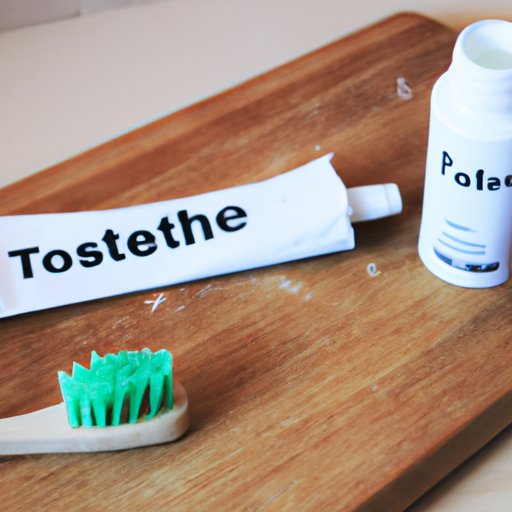
Introduction
Are you tired of relying on store-bought toothpaste that contains questionable ingredients? Have you ever considered making your own toothpaste at home? Not only is it possible, but it can also be a fun and rewarding experience.
In this article, we’ll cover everything you need to know about making your own toothpaste, including a step-by-step guide, benefits of using natural ingredients, and potential cost savings.
Step-by-Step Guide to Making Your Own Toothpaste
Making toothpaste at home is actually quite simple. Here are the basic steps:
Gather necessary ingredients and tools
You’ll need a few basic ingredients that can be found at your local health food store or online:
- Baking soda
- Coconut oil
- Xylitol or stevia
- Essential oils (peppermint, cinnamon, etc.)
You’ll also need a mixing bowl, spoon or spatula, and a small container for storing your toothpaste.
Measure out ingredients in appropriate ratios
The exact ratio of ingredients will depend on your personal preference and the consistency you’re aiming for. A basic recipe to start with is:
- 1/2 cup baking soda
- 2-3 tbsp of coconut oil
- 1-2 tbsp of xylitol or stevia (to taste)
- 10-15 drops of essential oil
You can adjust the amount of coconut oil based on how thick you want your toothpaste to be. Xylitol or stevia can be adjusted based on your desired level of sweetness.
Mix ingredients together thoroughly
Add all of the ingredients to your mixing bowl and stir until thoroughly combined. Be sure to mix well to ensure that all ingredients are evenly distributed.
Store toothpaste properly
Your toothpaste can be stored in a small container or even a mason jar. Be sure to keep it in a cool, dry place and use within a few months.
Benefits of Making Your Own Toothpaste
There are several benefits to making your own toothpaste at home:
Potential health benefits compared to store-bought toothpaste
Many commercial toothpaste brands contain harmful chemicals such as triclosan, sodium lauryl sulfate, and fluoride. By making your own toothpaste, you can avoid these potentially dangerous ingredients and use natural alternatives instead.
Benefits of natural ingredients and avoiding harmful chemicals
Natural ingredients such as baking soda, coconut oil, and essential oils have been shown to have numerous benefits for dental health. Baking soda, for example, can help to neutralize harmful acids in the mouth, while coconut oil has antibacterial properties that can help to reduce plaque and fight gum disease.
Highlight cost savings in the long run
While the initial cost of purchasing the necessary ingredients may be slightly higher than simply buying a tube of toothpaste, making your own toothpaste can be much cheaper in the long run. With just a few basic ingredients, you can make multiple batches of toothpaste.
Comparing Different Recipes
There are several different recipes for making your own toothpaste, each with its own unique benefits. Here are a few options to consider:
Baking Soda and Hydrogen Peroxide Toothpaste
This recipe uses baking soda and hydrogen peroxide to create a powerful toothpaste that can help to whiten teeth and fight plaque. The recipe includes:
- 2 tsp baking soda
- 1 tsp 3% hydrogen peroxide
- A few drops of essential oil (peppermint, cinnamon, etc.)
Coconut Oil Toothpaste
This recipe uses coconut oil as its base and includes:
- 2 tbsp coconut oil
- 2 tbsp baking soda
- 10 drops peppermint essential oil
Mint and Green Tea Toothpaste
This recipe uses green tea and essential oils to create a refreshing toothpaste that’s packed with antioxidants. The recipe includes:
- 1/2 cup baking soda
- 1/4 cup green tea
- 1 tsp xylitol or stevia
- 10 drops peppermint essential oil
- 5 drops tea tree oil
Natural Ingredients for Toothpaste
If you’re interested in experimenting with different toothpaste ingredients, here are a few natural options to consider:
Baking Soda
Baking soda is a natural and gentle abrasive that can help to remove stains and neutralize harmful acids in the mouth.
Coconut Oil
Coconut oil has antibacterial properties and can help to reduce plaque and fight gum disease.
Peppermint Oil
Peppermint oil has a refreshing taste and also has antibacterial properties that can help to kill harmful bacteria in the mouth.
Xylitol or Stevia
Xylitol and stevia are natural sweeteners that can help to improve the taste of toothpaste without causing harm to teeth.
Negative Effects of Store-Bought Toothpaste
Many store-bought toothpaste brands contain harmful chemicals such as triclosan, sodium lauryl sulfate, and fluoride. These chemicals have been linked to a range of health problems, including hormonal imbalances, allergies, and even cancer.
By making your own toothpaste, you can avoid these potentially dangerous ingredients and use natural alternatives instead.
Personal Experiences
Many people who have switched to making their own toothpaste report improved dental health and a better overall experience. By using natural ingredients, they are able to avoid the harsh chemicals found in many commercial toothpaste brands.
One person shared, “After switching to homemade toothpaste, I noticed that my teeth felt cleaner and my breath was fresher. I also love knowing exactly what’s in my toothpaste and that it’s all natural.”
Financial Benefits
The cost of making your own toothpaste can vary depending on the ingredients you choose, but it is often much cheaper than purchasing store-bought toothpaste over time.
For example, a tube of natural toothpaste can cost upwards of $10, while a batch of homemade toothpaste may only cost a few dollars and last for several months.
Conclusion
Making your own toothpaste at home is an easy and cost-effective way to improve your dental health and avoid potentially harmful ingredients. By using natural ingredients and experimenting with different recipes, you can customize your toothpaste to meet your unique needs and preferences.
So why not give it a try? Your teeth (and your wallet) will thank you.




